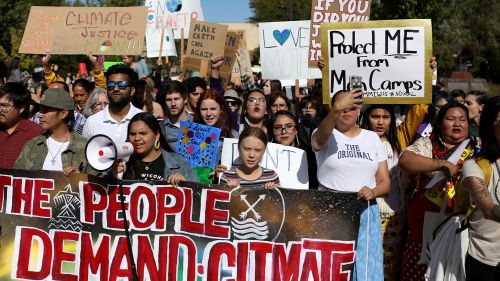The Generational Divide Over Climate Change

Many have come to term the generational divide around climate change beliefs the "global warming age gap"—and many more are deeply concerned about its implications for climate change policy.
Just a few weeks ago, environmental advocate Greta Thunberg delivered an address to the UN General Assembly in which she demanded that member countries take extreme and immediate action to combat climate change. Many remarked on her passion, anger, and desperation, but if one thing was noted the most, it was Thunberg’s age. At just 16 years old, Thunberg has become a highly popular and outspoken environmental activist, speaking often of the inaction of those in positions of power. This frustration speaks to a larger trend, in that younger generations tend to feel more strongly about the issue of climate change than their older counterparts.
According to data from the 2019 Chicago Council Survey, a majority of Americans under the age of 45 describe climate change as a critical threat (63% of 18-29 year-olds, 60% of 30-44 year-olds). These numbers come into contrast with responses from Americans 45 years and older. Within this particular demographic, just half of those aged 45 to 64 say it’s a critical threat, and only a plurality of those 65 years or older hold that belief. Furthermore, 21% of those 65 years and older would argue that climate change is actually not an important threat.
Climate Change Views Vary by Age
Below is a list of possible threats to the vital interest of the United States in the next 10 years. For each one, please select whether you see this as a critical threat, an important but not critical threat, or not an important threat at all:
July 7-20, 2019 | n= 2,059
Source: Chicago Council Surveys
Beyond perceptions of threat criticality, ideas about how to confront climate change are equally variable across age groups. Amongst Americans 18 to 29 years old, 58 percent believe that climate change is a serious and pressing problem and that we should begin taking steps now, even if it involves significant costs. In contrast, less than half of Americans 45 and older share this same belief (48% of 45-64-year-olds and 47% of those 65 and older). Moreover, while only 10 percent of those 18 to 29 years old hold the belief that we should not take any steps to combat climate change that would have economic costs, nearly twice as many people aged 45 years and older (19% of 45-64-year-olds and 20% of those 65 years and older) hold that belief.
Climate Policy Positions Face an Age Divide
There is a controversy over what the countries of the world, including the U.S., should do about the problem of climate change. Here are three statements. Please tell me which statement comes closest to your own point of view.
Key
A = Until we are sure that climate change is really a problem, we should not take any steps that would have economic costs.
B = The problem of climate change should be addressed but its effects will be gradual, so we can deal with the problem gradually by taking steps that are low in cost.
C = Climate change is a serious and pressing problem. We should begin taking steps now even if this involves significant costs.
July 7-20, 2019 | n = 2,059
Source: Chicago Council Survey
Despite this gap, looking at survey results from the past decade, the Council’s data suggests that all age groups have grown increasingly worried about climate change, though that increase has been most dramatic among 18 to 29-year-olds. In fact, as of 2010, 18 to 29-year-olds were the least concerned about climate change with only 26% of that age group finding climate change to be a “serious and pressing problem”. In 2019, that number jumped to 59%, making 18 to 29-year-olds by far the most concerned by the issue. While the spread of information and awareness has caused increasing concern among all Americans, the youngest Americans are those particularly troubled by the phenomenon’s potentially catastrophic consequences.
Shifts in Climate Change Views Over Time
There is a controversy over what the countries of the world, including the U.S., should do about the problem of climate change. Here are three statements. Please tell me which statement comes closest to your own point of view: Climate change is a serious and pressing problem. We should begin taking steps now even if this involves significant costs.
July 7-20, 2019 | n = 2,059
Source: Chicago Council Survey
Many have come to term the generational divide around climate change beliefs the “global warming age gap”—and many more are deeply concerned about its implications for climate change policy. Activists like Thunberg have made it alarmingly clear to their peers that when her generation finally achieves positions of power, it will be far too late to avert the most serious impacts of climate change. To quote her UN address directly, Thunberg asserted to member delegates, "the eyes of all future generations are upon you. And if you choose to fail us, I say: We will never forgive you." With more and more young people feeling failed by those older and in power, it has become clear that age is an incredibly salient issue in regard to climate change. Activists are now working to close the divide by bringing more attention to the issue through the use of global student strikes. Just last week, millions of students worldwide walked out from their classrooms to demand renewed action on climate change. With rapidly growing demonstrations like these, it is clear the world’s youth are desperate to close this gap, as it might be the only hope to effectively address this critical threat.
